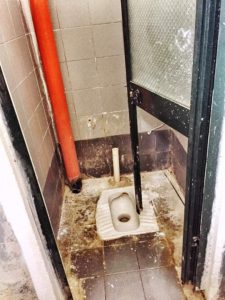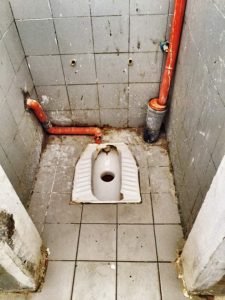This project is made possible through the partnership of Water Charity and the National Peace Corps Association. ![]()
This is a project under the LET GIRLS LEARN Program, a collaboration of First Lady Michelle Obama and the Peace Corps to expand access to education for adolescent girls around the world!
Location
Rreshen Town, Mirdita, Albania
Community Description
Rreshen Municipality is part of the Mirdita District and the Prefecture of Lezhe in Northwest Albania. Rreshen Municipality consists of 14 villages and has a total population of approximately 20,000 inhabitants. It is located 74 km from the capital of Tirana. 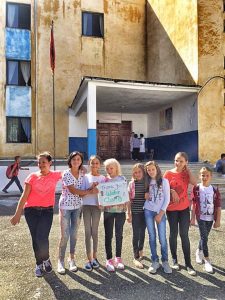
Mirdita is historically known as the only district in Albania that stopped the Muslim Ottoman Empire from expanding its power there, so it became the only Catholic district in the entire country.
Mirdita is a traditional tribal land; its name was recorded in 1571 and in English means “good day.” The town of Rreshen is a humble and small community with one main road that runs through the entire town. Along this road could be found in coffee shops, clothing stores, hair salons, bank offices, small parks, a fresh market, and a grocery store. At the center of Rreshen is located the Bashkia, the Ministry of Education, the cultural building and a couple of coffee shops. The people of Rreshen are very friendly, kind and proud of their heritage and Mirdita’s history.
The town of Rreshen has one kindergarten, two elementary and middle schools (Mother Teresa and Pashko Vasa), one high school, and one vocational school.
Problem Addressed
Rreshen is typical of many towns in Albania, which have appalling school toilets. It is also typical, in that more boys than girls are in school. Girls in the schools are unable to use the toilet facilities, for both privacy and sanitation reasons, which means that many of them go to their home to use the bathroom, do not use the bathroom at all, or use a nearby bar. Whichever option they choose there is safety, attendance (once they go home they tend not to come back), and/or health implications.
Specifics Issues:
•The school is a two-floor structure, on each floor, there are 9 toilets; 3 toilets are dedicated to girls and 6 toilets for boys.
•Since September 2014, the Mother Teresa School has a pending notice of violation from the Rreshen Public Health office; currently, the bathrooms at the school are not meeting the sanitary standards according to the health office.
•The 18 toilets at the school do not flush because they are missing a flusher cistern. Only some students will flush the toilets using buckets of water, but primarily the janitors are the ones that flush the toilets by the end of the school day.
•The school needs a supply of water to flush the toilets; the water at the school is provided by the city on a scheduled basis, therefore the school uses cisterns to store water. The school needs a water tank to ensure running water to improve the meager conditions of the bathrooms, provide hygiene, and overall to keep student’s attendance at the school. Many girls refrain from using the bathrooms. When girls are going through their menstrual period, many of them prefer to use the bathrooms at their home or go to a near coffee shop; some will return but others will not return to class. The teenage girls would prefer to use a western toilet because is cleaner, is away from the ground (prevents them from getting any bacteria), and is more comfortable.
•The faucets need to be replaced; most of them are broken or not working properly. The school needs to provide working hand basins and faucets so the students can wash their hands after using the toilets. Hygiene is crucial to preventing stomach and intestinal diseases. The students mentioned that there is no clean water and soap to wash their hands, and the water in the cisterns is not completely clean; there are particles of dirt in the bottom of the cisterns.
•The girls at the school do not feel safe when going to the bathroom and do not have privacy; the two main doors when entering into the girl’s bathroom do not have a lock and the stall doors need functional locks. The lack of locks on the doors exposes the female students to harassment. The boy’s bathroom is next to the girl’s bathroom, which forces the girls to go to the bathroom in pairs, while one uses the restroom the other one watches the door.
•The bathroom for the boys in the second floor does not have a door, the boys do not flush the toilets, and the girls are exposed to the urine smell from this open restroom; there are no water cisterns in the boy’s bathroom. There is a need to add at least a door to one of the stalls in the boy’s bathroom for the teacher’s privacy.
•The last time the bathrooms at the Mother Teresa School had an upgrade was in 2005 at the expense of the Director and the teachers, but the current conditions of the bathrooms are now beyond their limits and they need external aid.
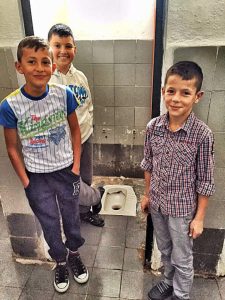 Project Description
Project Description
This project is part of a community restoration project for the Mother Teresa elementary and middle school. The goal of this project is to improve the inadequate conditions of the 18 bathrooms at this school so that the students are able to use the bathroom facilities at the school and are not forced to go offsite to use the bathrooms at a Café business or at their home. This project is a joint effort of the Bashkia, the school staff, members of the community, the Peace Corps, and the Water Charity.
The project restoration will be a combination of Western and Turkish toilets and will take an average of three days. It will include the renovation of existing toilets, air pipes, water pipes, doors (adding handles to doors and locks on all stall doors), and faucets that are broken and are not meeting the sanitary conditions. Also, it will include the addition of two water tanks on the roof to provide running water all day, a flusher cistern for each Turkish toilet that is currently missing one, and two doors for the boy’s bathroom on the second floor. The tile in each toilet floor area will be replaced, due to the removal of older sewer pipes to add new ones.
The Mayor of Rreshen, Ndrec Dedaj will support the project by covering the labor on the municipality’s payroll. Florjan Ndrejaj is a private plumber who helped initially with the project; however, the Bashkia has provided two plumbers, two builders, a carpenter, a tiling contractor, and an engineer to help us prepare the budget and do the assessment of what needs to be repaired and replaced in the bathrooms. Mr. Pashka Ndoja is a private carpenter, a well-known individual within the community; he evaluated the conditions of the doors and told us what needs to be repaired and how we could replace some parts of these doors in a more cost-effective approach.
The Director of Mother Teresa School, Nora Kaqorri and the teacher’s staff will donate a total of 14,000 leke; this money will be used to buy paint, and toiletry supplies such as soap, toilet paper, and trash cans for each bathroom. This donation will be given in order to support the sustainable education program that the school will offer each week for two hours. The student’s parents will also contribute to toiletry supplies, labor, and a monetary donation according to their financial possibilities.
Project Impact
This project will directly benefit 481 people; 446 students, 30 teachers, 3 sanitary employees, 2 security officers, parents, and guests.
Peace Corps Volunteer Directing Project
Pier A. Vernaza
Monitoring and Maintenance
The supplies and maintenance of the renovated bathrooms will be the responsibility of the Bashkia Rreshen and the Mother Teresa School; the janitors, teachers and the Director will jointly collaborate in this effort to inspect and keep up to date on the maintenance of the bathroom facilities. The school will provide through the “Ore Educative” program sessions to students about handwashing and sanitation. Peace Corps Volunteer Pier Vernaza and Bledar Jushi will accompany the plumber and the engineer of the Bashkia to purchase the materials listed in the proposed budget.
Comments
This project is part of the Let Girls learn program sponsored by FLOTUS Michelle Obama. The goal of this project is to keep girls in school and boys too. Lack of proper 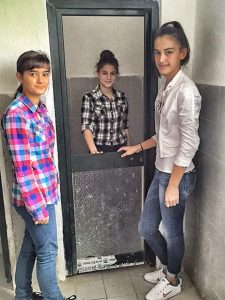 functioning bathrooms forces girls to drop school as teenagers. It is a crucial responsibility for schools to provide clean bathrooms with functioning doors, and proper working toilets to allow girls a healthy and safe environment.
functioning bathrooms forces girls to drop school as teenagers. It is a crucial responsibility for schools to provide clean bathrooms with functioning doors, and proper working toilets to allow girls a healthy and safe environment.
Another problem worth mentioning, due to the lack of proper bathrooms, it is not fair for these teenage girls to have to “hold” their need to use the bathrooms because of the lack of proper doors, and unhealthy and broken toilets. These girls are compelled to return home or seek the nearest café place to go. When seeking alternative places to go, the girls could (and this is not unusual) possibly be exposed to harassment or assault. If the girls go home, it is unlikely that they will return. If the girls are “holding” it, this situation can lead to urinary tract infections and kidney infections. If the infections are recurring they can lead to reproductive health harm.
Another problem that could arise from not using the bathrooms, is if the girls do not have properly functioning toilets to use, they may feel obliged to not drink liquids during the day and may suffer from dehydration. Chronic dehydration can lead to problems such as gastritis, heartburn, arthritis, headaches, depression and weight problems. For school girls who are menstruating, not having a place to change their sanitary pads, dispose of them, and wash their hands very often leads to girls missing school while menstruating.
The project is part of WC’s Let Girls Learn Initiative – Worldwide which includes all the projects we do under the Let Girls Learn program.
This project will be happening thanks to the incredible striving “100 Water Projects” program that Water Charity is funding in Albania, as a major thrust of the LGL initiative. The ambitious scope is due in large part to the efforts of PCVs Graham & Teresa Anderson. In addition, this project has valuable support from the community members, the Director of the school, Nora Kaqorri, the teacher’s staff, the parents of the students, and the Mayor of Bashkia Rreshen, Ndrec Dedaj who altogether will provide more than the required 25% community contribution, which includes labor, cleaning and toiletry supplies.
Dollar Amount of Project
$1,846.57
Donations Collected to Date
$1,846.57
Dollar Amount Needed
$0.00 – This project has been fully funded through the generosity of Wilco Krul, of Einhoven, Netherlands.
![]() Additional donations will go to other projects in Albania.
Additional donations will go to other projects in Albania.
This project has been completed. To read about the conclusion, CLICK HERE.
